|
|
|
Sort Order |
|
|
|
Items / Page
|
|
|
|
|
|
|
| Srl | Item |
| 1 |
ID:
093087
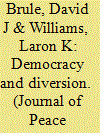

|
|
|
|
|
| Publication |
2009.
|
| Summary/Abstract |
Do legislative constraints constrain or compel democratic executives' conflict behavior during periods of economic decline? Although institutional constraints are thought to reduce democratic executives' propensity to engage in interstate conflict, other research suggests that such constraints may provide incentives to engage in diversionary uses of force. Incorporating work from the comparative study of economic voting and cross-national research on the diversionary use of force, this article contends that government arrangements - coalition, minority, weak party cohesion - influence democratic conflict behavior by (1) shaping the extent to which the executive is held accountable for the economy and (2) determining the executive's capacity to address the economy with legislation. Specifically, the argument presented here suggests that governing parties in coalition governments share the blame for a poor economy, reducing the likelihood that the executive initiates disputes in response to the economy. Compared to single-party majority governments with high party discipline, executives presiding over minority governments, or whose parties are plagued by a lack of cohesion, are more likely to initiate disputes when faced with poor economic conditions, because these executives are likely to face resistance to remedial economic policy. Probit analyses of the interactive effects of government arrangements and economic performance on dispute initiation among industrialized democracies, 1950-97, support the argument. The article concludes with implications for research in comparative politics and international relations, including, for example, executive-legislative relations and strategic conflict avoidance.
|
|
|
|
|
|
|
|
|
|
|
|
|
|
|
|
| 2 |
ID:
174761
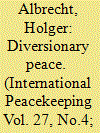

|
|
|
|
|
| Summary/Abstract |
What is the impact of international peacekeeping missions for civil-military relations at home? This article unpacks the conditions that produce positive effects of peacekeeping participation on the domestic politics of an authoritarian regime. Drawing on field research, I discuss four mechanisms that link foreign policy making to domestic civil-military relations in Ben Ali’s Tunisia. First, the deployment of troops for peacekeeping abroad presents obstacles for the coordination of coup plots at home. Second, incumbents can allocate material resources to meet officers’ economic grievances. Moreover, peacekeeping operations serve to enhance corporate institutionalization through specific training programmes. Finally, peacekeeping contributes to a professional ethos and hence the depoliticization of the officer corps. These findings give rise to the notion that contributing to peace can have similar effects for domestic politics as going to war.
|
|
|
|
|
|
|
|
|
|
|
|
|
|
|
|
| 3 |
ID:
146198
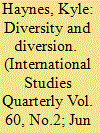

|
|
|
|
|
| Summary/Abstract |
How does a state’s ethnic composition affect its propensity to engage in diversionary conflicts? Recent empirical work examines the political conditions under which domestic unrest compels an embattled leader to initiate conflict abroad. We remain uncertain, however, of what social or demographic characteristics make states particularly prone to diversionary behavior. This article tries to address this gap, examining whether a state’s ethnic structure conditions its leader’s response to domestic discontent. Combining the expansive literatures on ethnic politics and diversionary war yields conflicting expectations here. I find that ethnically fragmented states are significantly more prone to initiating diversionary conflicts, and I show that the greater availability of “conflict opportunities” resulting from transborder ethnic-kin groups, in part, drives this effect. A brief case study illustrates these dynamics.
|
|
|
|
|
|
|
|
|
|
|
|
|
|
|
|
| 4 |
ID:
154652
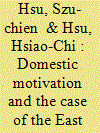

|
|
|
|
|
| Summary/Abstract |
China's declaration of an air defense identification zone (ADIZ) in the East China Sea shocked the international community, and many explanations have been offered about the motivation behind it. We argue that domestic politics played a key role in the ADIZ policy. However, existing studies have not paid sufficient attention to decisionmakers' political motivation. To fill this gap, we explore two distinct models: the diversionary foreign policy model and the mobilization model. Both models focus on the linkage between the state leader's domestic political consideration and foreign policy behavior, but each has different theoretical and empirical implications. Our findings suggest that the mobilization model offers a better explanation of the motivation for China's move.
|
|
|
|
|
|
|
|
|
|
|
|
|
|
|
|
| 5 |
ID:
083747
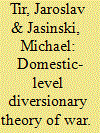

|
|
|
|
|
| Publication |
2008.
|
| Summary/Abstract |
According to the diversionary war theory, problematic domestic circumstances motivate a country's leader to divert popular discontent by launching a militarized international crisis. Yet, empirical support for this argument has proved to be ambiguous at best. Relying on extant ethnic conflict research, we argue that the embattled leader can elicit public support by using armed force against ethnic minorities within his/her country. We call this option domestic diversion and argue that it is not only available to a larger number of leaders, but that it also often presents a less risky course of action than external diversion. Empirical tests of the domestic diversionary hypothesis show a connection between domestic problems facing the leader and the use of force against minorities. This finding provides a potentially new interpretation for the causes of some domestic conflicts, and suggests that the diversionary theory may operate on the domestic level of analysis.
|
|
|
|
|
|
|
|
|
|
|
|
|
|
|
|
| 6 |
ID:
082932


|
|
|
|
|
| Publication |
2008.
|
| Summary/Abstract |
Although research on conflict has tended to separately study interstate conflict and civil war, states experiencing civil wars are substantially more likely to become involved in militarized disputes with other states. Scholars have typically focused on opportunistic attacks or diversionary wars to explain this domestic-international conflict nexus. The authors argue that international disputes that coincide with civil wars are more often directly tied to the issues surrounding the civil war and emphasize intervention, externalization, and unintended spillover effects from internal conflict as important sources of international friction. They empirically demonstrate that civil wars substantially increase the probability of disputes between states. An analysis of conflict narratives shows that the increased risk of interstate conflict associated with civil wars is primarily driven by states' efforts to affect the outcome of the civil war through strategies of intervention and externalization and not by an increase in conflicts over unrelated issues.
|
|
|
|
|
|
|
|
|
|
|
|
|
|
|
|
| 7 |
ID:
109132
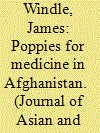

|
|
|
|
|
| Publication |
2011.
|
| Summary/Abstract |
This study examines India and Turkey as case studies relevant to the Senlis Council's 'poppies for medicine' proposal. The proposal is that Afghan farmers are licensed to produce opium for medical and scientific purposes. Here it is posited that the Senlis proposal neglects at least three key lessons from the Turkish and Indian experiences. First, not enough weight has been given to diversion from licit markets, as experienced in India. Second, both India and Turkey had significantly more efficient state institutions with authority over the licensed growing areas. Third, the proposal appears to overlook the fact that Turkey's successful transition was largely due to the use of the poppy straw method of opium production. It is concluded that, while innovative and creative policy proposals such as that of the Senlis proposal are required if Afghanistan is to move beyond its present problems, 'poppies for medicine' does not withstand evidence-based scrutiny.
|
|
|
|
|
|
|
|
|
|
|
|
|
|
|
|
| 8 |
ID:
182543
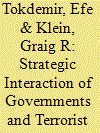

|
|
|
|
|
| Summary/Abstract |
When governments’ ability to maintain power is threatened, they use any tool at their disposal to re-establish or boost their survival. In this paper, we theorize dyadic strategic choices and interactions between governments and domestic terrorist groups in times of economic turmoil. We contend that governments are more likely to increase their targeting of domestic terrorist groups, which provides legitimate opportunities to divert public attention from economic concerns and rally individuals around the flag. Meanwhile, observing such incentives, domestic terrorist groups make strategic decisions similar to those of interstate actors by either decreasing their attacks (strategic conflict avoidance) or increasing them (strategic conflict seeking) to add an inability to provide safety and security to the government’s existing struggles. We test these competing hypotheses by leveraging two recently released event datasets focusing on the Turkey-PKK conflict. Our findings contribute to the terrorism studies literature on decision-making and strategic choices, and broader scholarship about conflict processes by testing conflict dynamics at the domestic level.
|
|
|
|
|
|
|
|
|
|
|
|
|
|
|
|
|
|
|
|
|